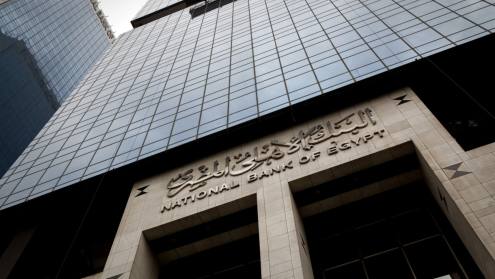After years of slow growth, Egypt’s banking sector has shifted into another gear that has seen the country emerge as a new favourite for international investors. Analysts of the deeply conservative Cairo markets are starting to expect the unexpected – but even so, recent announcements of a possible merger between Commercial International Bank (CIB), one of Egypt’s top three private banks, and Arab African International Bank, have raised a few eyebrows.
The deal, which is being kept very hush-hush while the two banks arrange talks, would create a bank giant with at least a 10% market share. CIB vice-chairman Sahar El-Sallab says: “The Central Bank of Egypt (CBE) and Capital Markets Authority (CMA) have asked us not to talk about this transaction until we properly structure something and say ‘hello’ to each other – we have not said it yet.”
Following on from the privatisation of Bank of Alexandria and rapidly increasing emerging markets investor interest, the move shows that prime minister Ahmed Nazif’s government’s reforms and privatisation programme has created a buoyant banking sector.
Cutting the number of banks by half to 35 has increased competition in the sector and renewed foreign interest; Gulf investors are particularly keen to get in. Bankers across the board are expressing their confidence in Egypt’s changing business climate, and Egypt was this year named by the World Bank as its top reformer.
The big ticket
In July, it was announced that state-owned Banque du Caire would be sold, reversing a decision made only a year ago to merge it with state-owned Banque Misr. Whoever buys into Banque du Caire will gain 230 branches and a 6.3% market share in assets, placing it comfortably among the largest private players. The furore surrounding the sale, which would raise E£8.8bn ($1.6bn), stems from the way the plan was presented to the public – a failed public relations exercise.
According to Ms El-Sallab: “When it was first decided to merge the bank it took a lot of time to infuse the idea into peoples’ minds. Then they decide to sell it without taking the time to explain their decision to the public.”
Mohamed Ozalp, vice-chairman of Banque Misr, which is responsible for the sale, told The Banker: “The initial decision was for a merger, but as we looked at the bank we found that there were a lot of things Banque Misr wouldn’t benefit from. These include the large number of employees, the deposit base or depository capability, an unattractive portfolio, a lot of the customers were the same or very similar, branches were very close or even back to back, and the licence had a value that was going to disappear. So on that basis, the idea to merge was changed.”
After the sale the two remaining public sector banks, Banque Misr and National Bank of Egypt will retain a 41% share of the market.
Banks that are interested are those that failed in previous privatisation rounds. So far, the list includes Dubai’s Mashreq Bank, owned by the Al-Ghurair family, and National Bank of Greece. Mashreq has also secured regulatory approval to open 10 branches in Egypt.
Banque Misr has chosen JPMorgan as financial adviser for the sale, which should take place in 2008 between April and June. The plan is to auction up to an 80% stake in the bank with 15% floated in an initial public offering (IPO), and 5% to be held by bank employees, as happened with the sale of Bank of Alexandria (BoA).
A success story
Ex-public sector bank BoA, now known as BoA Intesa San Paolo, epitomises the reforms that have taken place in the banking sector. It has turned itself around from a bank with 75% to 80% of its portfolio in non-performing loans to one that secured profits of E£400m in the first half of 2007 from core banking business.
Now preparations are taking place for an IPO. Beltone has been appointed as financial advisor, and is working on the valuation for a 15% float before year-end. According to vice-chairman of BoA, Fatma Lotfy, the bank is “expecting more than E£2bn from the IPO”.
Restructuring the bank meant automating services that were previously done manually, and this paid off in a 2006 sale to Italy’s Intesa San Paolo that was six times book value.
In 2003, account statements were still hand-written, and cheques were processed in two hours. Ms Lotfy said: “Now we process cheques in three minutes.”
New IT systems were put in place, the running of the bank and its branches was centralised, employees were re-trained and a credit risk management division was created. Another important move was reducing the number of bank staff from 8500 to 5600.
The bank is aggressively pursuing lending to small and medium-sized enterprises (SMEs). Ms Lotfy says its success stems from an ability to give people access to credit due to an extensive network of 200 branches.
She says: “We exist in governorates where people exist, unlike many other multinational companies.”
Lebanon’s Audi Saradar Group is planning an aggressive expansion plan in Egypt to meet its target of gaining at least 2.5% to 3% market share over the next five years, and a network of 70 to 100 branches. Today the bank operates 16 branches, and is targeting 30 by year-end.
A major step towards achieving its goals is the signing of a deal with Omar Effendi, one of the largest department stores in Egypt, allowing the bank to place about 70 automated teller machines (ATMs) within the store’s geographical network across Egypt, along with consumer finance kiosks in each of the shops. Bank Audi is also seeking central bank approval to operate 20 to 30 branches within the Omar Effendi network.
Exclusive deal
The department store, an icon of Egypt’s economy for more than a century, was privatised last year. It is now owned by the Saudi Arabian Anwal United Trading Company, whose chairman is Jamil Gnaibit and is among the kingdom’s largest retailers, alongside the Al-Hokair group. The deal between Bank Audi and Anwal was closed on August 5 with exclusivity for the next five to 10 years.
Vice-chairman and managing director of Bank Audi Egypt, Gaby Kassis, says: “This shows our determination to deliver on the promises we have been making.” Bank Audi now has 500 employees, up from 30 staff 13 months ago. Kassis says the bank will employ 1000 people by the end of 2008. The bank is also targeting SMEs. Mr Kassis adds: “We have already built a loan book of $450m with corporate companies.”
Blom Bank made its foray into the Egyptian market in December 2005 with the acquisition of Misr Romanian Bank. Since then it has used its profits to reduce debt accumulated through the purchase. Managing director Alaa El-Din Samaha says: “We have reduced debt by E£100m and more than E£500m remains. Discussions are taking place to settle this, but it is a long-term settlement.” Blom’s total assets in Egypt reached E£5.5bn in October with 13 branches operational, up from eight in mid-2006, and a target of 23 by year-end. Growth in deposits was 22% to 23% by end-2006, and in H1-2007 the bank made a net profit of E£42m, up 22.4% on the same period last year.
The bank’s strength is its retail business. It has made E£12m of mortgage bookings, and recently formed an alliance with Commercial International Life (CIL), part of the CIB group, to sell its insurance products in the bank’s Cairo branches. The aim is to sell CIL’s insurance products in all branches by end-2007.
Mortgage market
Reforms in Egypt’s real estate sector, such as reducing property registration fees from 13% to 3% with a cap of E£2,000 and improving foreclosure laws for banks in case of a loan default, have given rise to a mortgage market.
But a point of contention remains that mortgage lending is capped at 5%. BoA’s Ms Lotfy says: “Banks are now much more comfortable to lend following the government’s reforms but we are capped, which means we need to grow the loan portfolio immensely to gain a significant share in the market. For the smaller banks I do not think they will have any role in the market because 5% will represent a very minimal amount.”
The CBE is looking at this issue seriously, but analysts say before the rate is increased it must first be ascertained whether banks will cope.
CIB’s Ms El-Sallab says: “We just need to do good business so that we can prove that mortgage lending, with information available in the market and within the given regulations, can be done successfully. We also need to show we can match the tenor of above 15 years.” Because of the cap, Blom Bank’s Mr El-Samaha says, “we are very selective with our clients”.
Despite serious attempts to keep the business community away from politics, recent events have shown the two are inseparable. On October 1, an Egyptian court summoned CBE governor Farouk El-Okdah and CMA chairman Ahmed Al-Latif to testify in the trial of Ibrahim Issa, editor of the independent daily newspaper Al-Dustour. He was accused of spreading false rumours about the health of president Hosni Mubarak.
State security prosecutors say that Mr Issa’s rumours led to the flight of $350m-worth of foreign investments in two days. None of the interviewees would comment on the incident. Only one said: “The media shouldn’t have the chance to stipulate things that would change the market in Egypt – we need to have freedom but educated freedom.”











